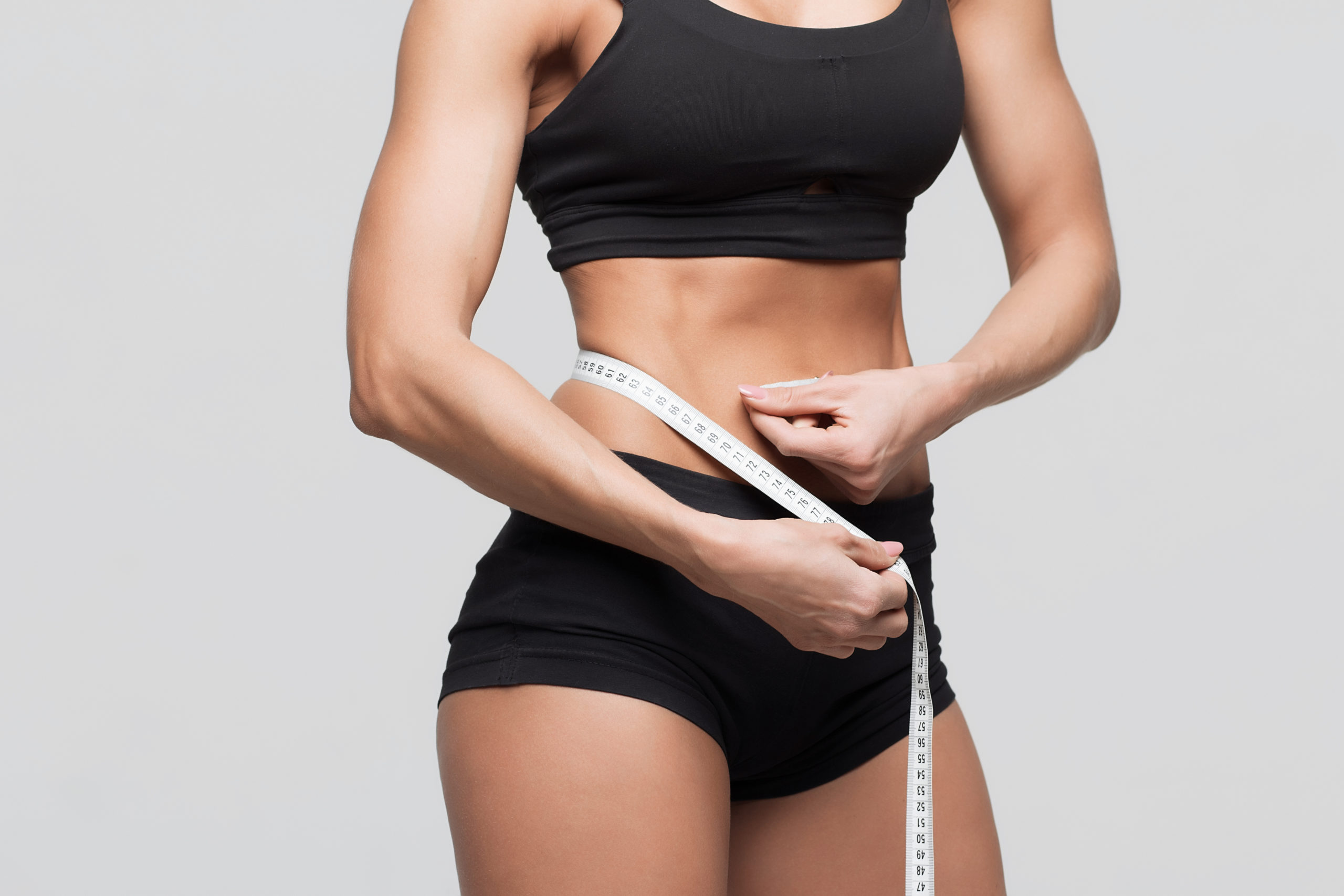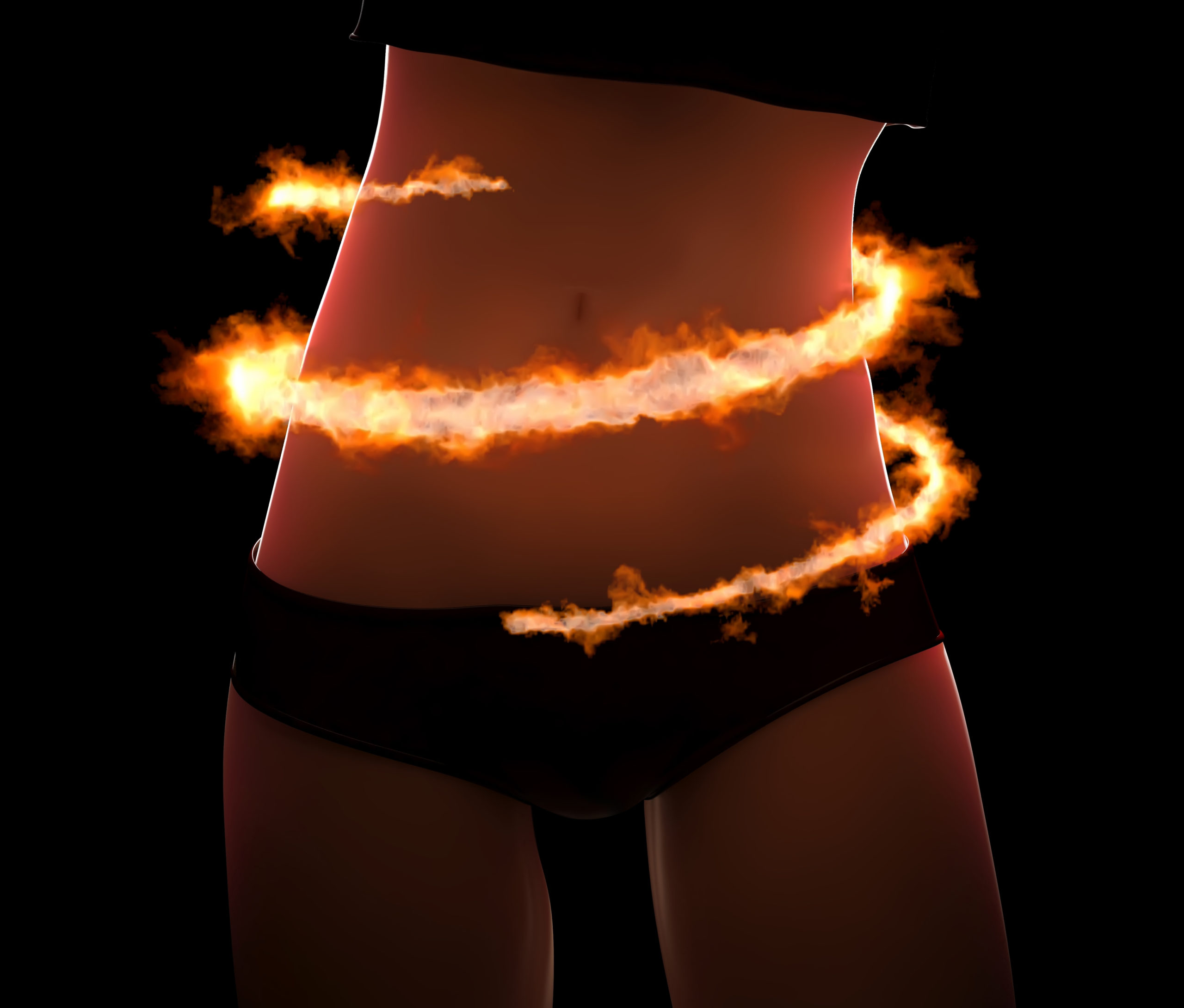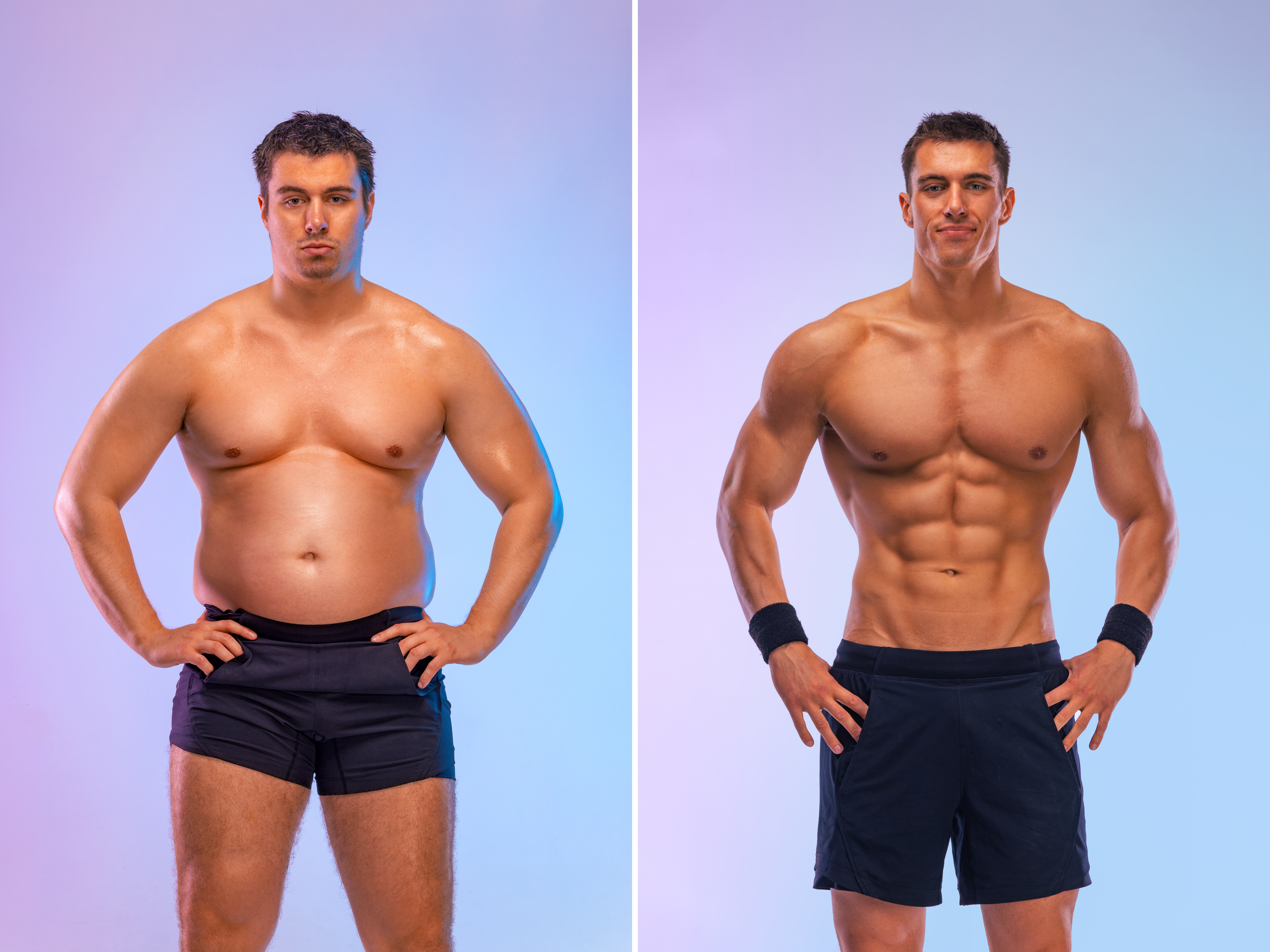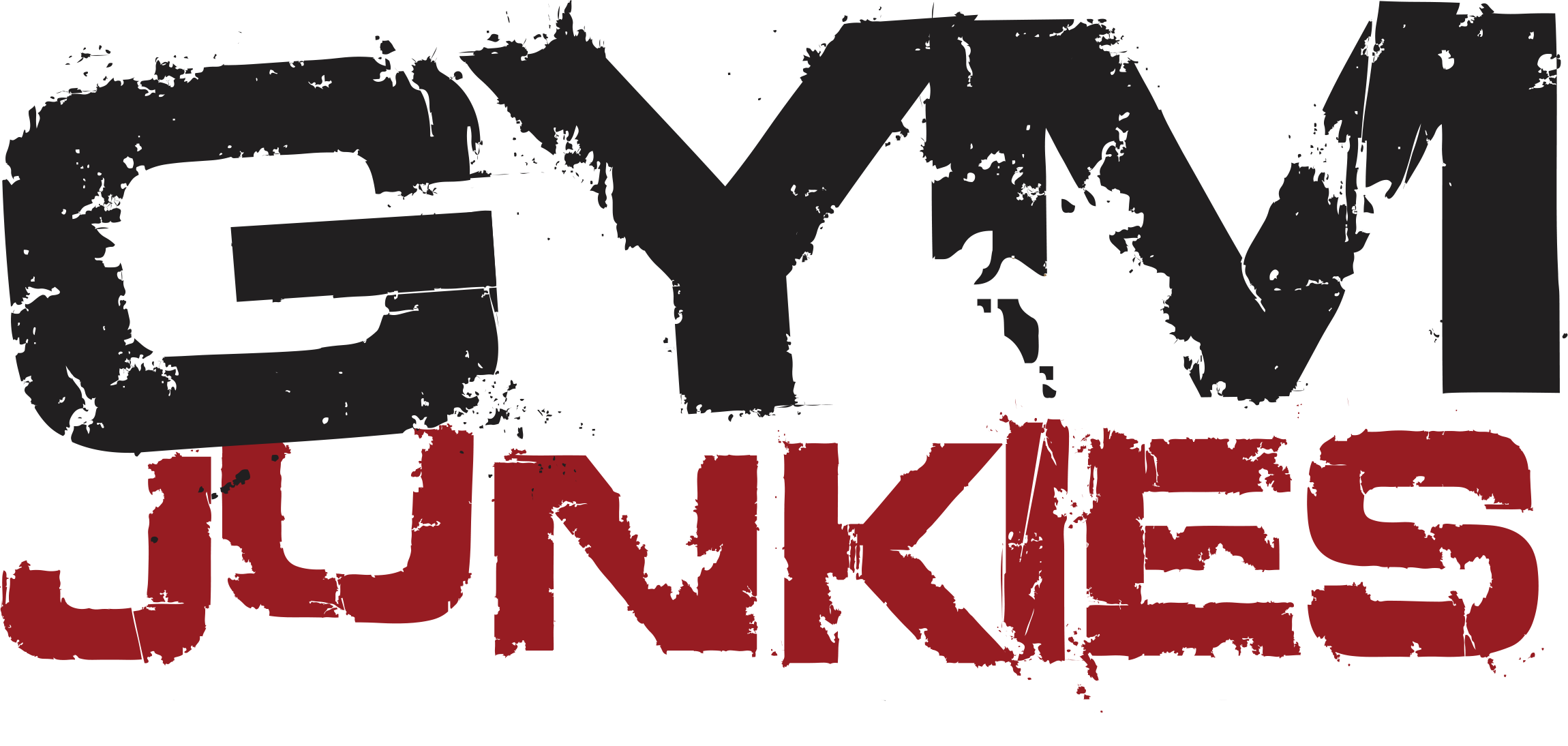
Losing fat is sought after by many people in the world, not only bodybuilders. This is understandable, as there is a lot of obesity, especially in America. There are a million different fat loss schemes and hacks out there, but most of them are not telling the truth. We are going to debunk some myths regarding fat loss, and tell you what you need to know.
The topics include spot reduction of fat, nutrition and training for fat loss, and what to avoid when you are training to lose body fat.
Four Important Factors for Fat Loss
When we are training to lose fat, there are several important things you need to consider. In particular your caloric deficit, the cordiality between your nutrition and training, and what type of training to perform.
1. Do Not Exaggerate Your Deficit
For our fat loss program, we sometimes might want to go hard and finish fast. Whether we are cutting our intake by decreasing calories a lot, or increasing our expenditure by training super hard. Or both. This is not how it works.
The truth is, there is a maximum rate at which your body can burn and metabolize fat. Consequently, using it for energy.
The key is to find the maximum threshold for your body’s ability to burn fat. This varies with every individual, and can only be found by starting out conservatively. You can then see how your body reacts, and adjust accordingly.
If you are burning the maximum amount of fat you can at a 500 caloric deficit, it does not mean you will burn 3 times more at a 1500 deficit.
2. Synchronize Nutrition and Training

Along with this, it is important that your nutrition matches your training. If your nutrition does not support the training you are doing, your ability to recover will suffer. Therefore, your results as well.
More often than not, it is our carbohydrate intake that will vary the most.
Protein and fat usually stay the same regardless of what phase we are in, except for in extreme circumstances. For instance, when you are getting very lean for a competition.
An adequate amount of carbohydrates is necessary to fuel your training performance, and recovery. When we are eating too few carbs, the replenishing of our glycogen stores are affected. Meaning, we will not have enough energy to keep performance high during training.
A high performance ensures we actually burn more calories during our workout. In turn, this can help increase the oxygen deficit, leading to a higher fat oxidation for a period of time after training.
This demonstrates the importance of eating enough carbohydrates for our training. It can be before, during and after training. Attempting to go all out, with super-sets from start to finish, and low rest periods, is not good. Coupled with low calories, it inhibits the ability for our bodies to recover.
Not only that, but our bodies will then break down protein for glucose, because the glycogen stores are empty.
For instance, metabolic workouts need more carbs. Do not be scared of carbs when you are training for fat loss. They can be a great tool when used correctly.
3. Refrain From Too Much Mechanical Damage
Because we are in a caloric deficit when losing fat, we want to avoid causing too much mechanical damage. Due to the fact that it requires a lot of resources from the body to repair this damage. Not only because we want to train more frequently, but also because we want to avoid this type of stress.
Mechanical damage takes a long time to recover from for our bodies.
The biggest cause of mechanical damage is training the muscles in the lengthened position. Hence, try to avoid too much stimulus in the lengthened position. For instance with super-sets, drop-sets, and training to failure in this position.
This does not mean you should not train the muscles in the lengthened position at all, but be conscious of your workouts. Because we are in a caloric deficit, our goal is not to pack on muscle at this point. As we said, recovering from mechanical damage takes a while for the body.
When we train for fat loss, we want to have a high frequency of our workouts. For this, we need to recover quickly.
Consequently, increase our nutrient partitioning. That way we can turn the glucose into glycogen and fuel it into our muscle tissue, thus pulling it away from fat. Accordingly, break down fat and use it for energy.
4. Avoid Excess Volume

In view of the fact that we are in a caloric deficit, we want to avoid unnecessary training and volume. Be conscious of your goal with your workouts, get in there, and get out.
There is no point in training your butt off, and not being able to walk out. Almost to the point where you need to be dragged out of the gym.
It might sound cool for your ego or Instagram, but it will not speed up your fat loss.
Even though you might “survive” it, your ability to recover is worsened. Meaning, you cannot train as frequently, which is an important factor when we workout to lose fat.
Losing Fat and Weight Is NOT Healthy
A common misconception is that losing fat and weight is healthy. It is not. Being in a caloric deficit is starvation. Being lighter with a lower body fat percentage is what is healthy.
We are not saying you should not lose fat, but it is important to be aware of the facts. Many people become disappointed when they are doing “healthy” things and not losing weight. Moreover, do not think that everything you read about losing fat and weight is healthy.
Not being aware of this can lead to poor decision making and torment when trying to lose fat.
Keep in mind that your mind will probably be a little iffy, recovery will not be as optimal, and energy levels will be lower. However, you are doing this for a healthy end goal in mind. Like we said, being lighter with less body fat.
Should I Take Fat Burners On Non Workout Days?

The question of fat burners comes up a lot. Honestly, fat burners are useless. They are something the fitness gurus and companies sell to make money. Because they are lean, and say they take fat burners, people will blindly buy it.
Do not fall into this trap. It will not help you lose fat.
What matters more is that your training and nutrition is congruent. Moreover, that it is structured for fat loss and for being in caloric deficit.
As for helpful supplements, try omega-3 and magnesium. Omega-3 will aid every single cell in the body. Not only can it help for fat loss, but for brain functioning, inflammation and your heart health as well.
Magnesium on the other hand, assists you with sleep and energy.
Chest Fat Burning Workout
Sorry to disappoint you, but there are none. Among others, spot reduction of fat is a common myth we see in the fitness industry. Workouts to lose fat in the belly, chest and butt.
None of these exist in reality, and if anyone tells you so, they are lying.
Where your body loses fat first, or in general, is genetically dependent. Some people carry little to no fat on their body, except for on their belly. Others in the butt and hips. While some, have it spread out pretty evenly.
In the same way, some first lose fat in their belly area, while others lose it in their arms and shoulders first. There is nothing you can do to change that.
What you can do is to train and eat for fat loss. Keep doing that until you are at your desired result.
Make sure your training and nutrition is synchronized, and that you are able to recover properly. In many instances, taking a de-load can be healthy and beneficial. If you have a lot of fat to lose, a de-load can help the body recover after being taxed so heavily. After all, a caloric deficit is starvation.
Conclusion
For an optimal fat loss journey, it is vital that your training and nutrition are synchronized. This is true for any workout plan. Moreover, do not be afraid of carbohydrates. They can be an effective tool to both fuel your workouts, and to help with recovery. Without enough glycogen, you will not be able to train at a high intensity. Thus, the amount of calories you burn will be lower. Also, avoid too much mechanical damage, and unnecessary volume. Keep in mind that losing fat and weight is not healthy in itself. It is the end goal of being lighter and having less body fat, that is healthy.
Thank you for reading our article!
– Terry Asher
Terry Asher
Latest posts by Terry Asher (see all)
- Better Family – Product Review Liquid Daily 2 oz - Dec 16, 2024
- Post-Workout Recovery: The Key to Optimal Performance - Nov 25, 2024
- Pre-Workout Supplements – Everything You Need To Know - Nov 18, 2024












I’m quite impressed with your writing, and your article’s content has captured my attention. I look forward to more outstanding posts.
[…] of the most common fat loss mistakes is to be aggressive with caloric restriction in the very beginning. This is because many […]
[…] of the frequent fats loss errors is to be aggressive with caloric restriction within the very starting. It is because many […]
[…] of the most common fat loss mistakes is to be aggressive with caloric restriction in the very beginning. This is because many […]
[…] of the most common fat loss mistakes is to be aggressive with caloric restriction in the very beginning. This is because many […]
[…] of the most common fat loss mistakes is to be aggressive with caloric restriction in the very beginning. This is because many […]
[…] of the most common fat loss mistakes is to be aggressive with caloric restriction in the very beginning. This is because many […]
[…] it comes to fat loss strategies, we usually want to start conservatively. Not only in terms of how aggressive you are […]
[…] it comes to fat loss strategies, we usually want to start conservatively. Not only in terms of how aggressive you are […]
[…] the case of fats loss methods, we normally need to begin conservatively. Not solely when it comes to how aggressive […]
[…] it comes to fat loss strategies, we usually want to start conservatively. Not only in terms of how aggressive you are […]
[…] it comes to fat loss strategies, we usually want to start conservatively. Not only in terms of how aggressive you are […]
[…] it comes to fat loss strategies, we usually want to start conservatively. Not only in terms of how aggressive you are […]
[…] it comes to fat loss strategies, we usually want to start conservatively. Not only in terms of how aggressive you are […]
[…] of the most common fat loss mistakes is to be aggressive with caloric restriction in the very beginning. This is because many […]
[…] in reality, carbs can be an amazing tool to not only help you shed off fatbut also gain […]
[…] course, everyone loves hypertrophy training and fat loss. Unfortunately many enjoy this not for their health benefits, rather to look a certain way in […]
[…] of the most common fat loss mistakes is to be aggressive with caloric restriction in the very beginning. This is because many […]
[…] it comes to fat loss strategies, we usually want to start conservatively. Not only in terms of how aggressive you are […]
[…] doesn’t just give you an immediate boost of energy, but it can also help your body to use fat for fuel instead of stored carbohydrates. This is because caffeine increases your metabolism and […]
[…] it comes to fat loss strategies, we usually want to start conservatively. Not only in terms of how aggressive you are […]
[…] of the most common fat loss mistakes is to be aggressive with caloric restriction in the very beginning. This is because many […]
[…] of the most common fat loss the mistake is to be aggressive with caloric restriction in the beginning. This is because many […]
[…] it comes to fat loss strategies, we usually want to start conservatively. Not only in terms of how aggressive you are […]
[…] of the most common fat loss mistakes is to be aggressive with caloric restriction in the very beginning. This is because many […]
[…] the subject of fat loss methods, we often wish to begin conservatively. Not solely by way of how aggressive you’re […]
[…] of the vital frequent fat loss errors is to be aggressive with caloric restriction within the very starting. It’s because […]
[…] Honestly talking, being round 90% correct is greater than ok most often, whether or not you need to acquire muscle or lose fat. […]
[…] right away increase of vitality, however it might additionally assist your physique to make use of fat for gasoline as an alternative of saved carbohydrates. It is because caffeine will increase your […]
[…] it comes to fat loss strategies, we usually want to start conservatively. Not only in terms of how aggressive you are […]
[…] of the most common fat loss mistakes is to be aggressive with caloric restriction in the very beginning. This is because many […]